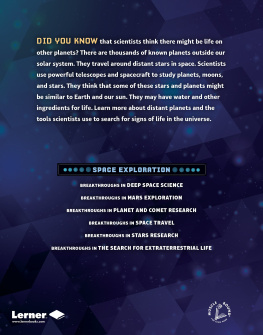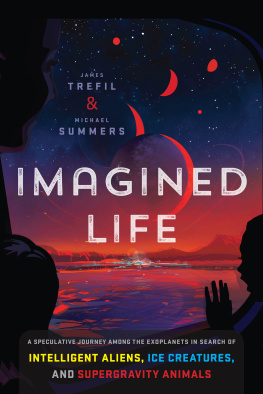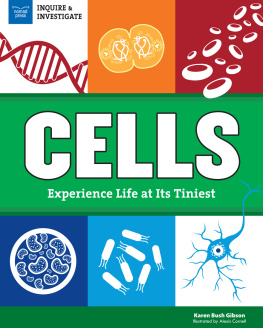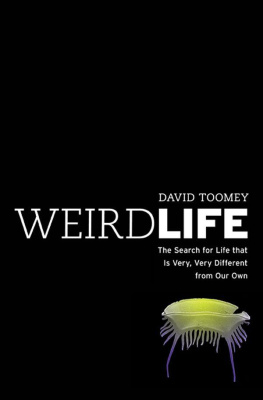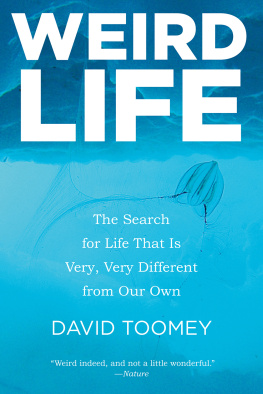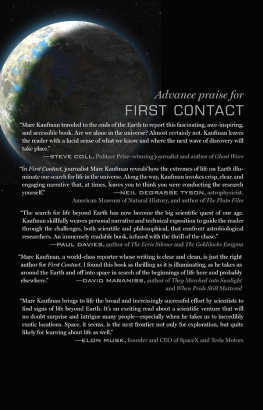LIFE
ON THE
EDGE
AMAZING CREATURES
THRIVING IN EXTREME
ENVIRONMENTS
LIFE
ON THE
EDGE
AMAZING CREATURES
THRIVING IN EXTREME
ENVIRONMENTS
MICHAEL GROSS
WITH A NEW AFTERWORD
THE AUTHOR
PERSEUS PUBLISHING
Cambridge, Massachusetts
Many of the designations used by manufacturers and sellers to distinguish their products are claimed as trademarks. Where those designations appear in this book and Perseus Publishing was aware of a trademark claim, the designations have been printed in initial capital letters.
Copyright 1998 by Plenum Press, New York.
Afterword to the paperback edition 2001 by Michael Gross
All rights reserved. No part of this publication may be reproduced, stored in a retrieval system, or transmitted, in any form or by any means, electronic, mechanical, photocopying, recording, or otherwise, without the prior written permission of the publisher. Printed in the United States of America.
Cataloging-in-Publication Data is available from the Library of Congress
ISBN 0-7382-0445-5
eBook ISBN: 9780738204451
Perseus Publishing is a member of the Perseus Books Group.
Find us on the World Wide Web at http://www.perseuspublishing.com
Perseus Publishing books are available at special discounts for bulk purchases in the U.S. by corporations, institutions, and other organizations. For more information, please contact the Special Markets Department at HarperCollins Publishers, 10 East 53rd Street, New York, NY 10022, or call 1-212-207-7528.
First paperback printing, January 2001
1 2 3 4 5 6 7 8 9 1003 02 01
Of Extremists and Eccentrics
A Personal Preface
Only connect!... Only connect the prose and the passion, and
the two will be exalted...
E, M. Forster, Howards End
Eccentrics live longer, happier, and healthier lives than conformist normal citizens, according to the neuropsychologist David Weeks. In 1984, Weeks started the first large-scale study of human beings who might be described as splenetic but have no psychiatric condition. His findings, which he summarized together with the journalist Jamie James in a coffee-table book, Eccentrics (1995), reveal that our society would be poorer without its eccentrics. Conformists may be easier to reign over, but they have neither written Ulysses nor developed the relativity theory. And not very many serious politicians ever managed to become nearly as popular as Joshua Abraham Norton, the King of California and Emperor of the USA, sadly overlooked by most history books. Asked whether he was eccentric himself, Weeks replied: Id be extremely proud to be thought of as eccentric, but I dont think Ive done enough yet to deserve it.
Some other inhabitants of our planet, however, deserve to be called thus, according to James Lovelock, the creator of the controversial Gaia theory and self-confessed nonconformist. He once compared those microbes that prefer extremely hostile conditionsand that are the heroes of this bookto the eccentrics of human society. If there is a link between eccentricity and the preference for extreme conditions, it may have been my hidden eccentric disposition, which directed me toward the extremes when I crossed the lawn that separates the chemistry and life sciences departments on the Regensburg campus, looking for a topic for my final-year thesis. As a chemistry student, I had come to like the ways and means of physical chemistry, but I wasnt particularly keen to study the dynamics of benzene-water mixtures or hypercritical mercury vapors. The influence of my then-girlfriend and lab partnera collaboration that has shifted to the field of bringing up childrenhad supplied me with a rather informal knowledge in biochemistry, a subject that some German chemistry departments are still trying to ignore. The extracurricular readings in modern molecular biology served as an antidote to the history-heavy chemistry courses. Only conned!applying physical chemistry to biomolecules, that was an attractive option. In my supervisor, Prof. Rainer Jaenicke, I found a kindred spirit, an exiled physical chemist in the Biology Department, who set me to work on a sufficiently eccentric project; the molecular adaptation of microorganisms to high hydrostatic pressures such as those found in the deep sea.
To generate high pressure in the laboratory, you need several kilograms worth of heavy metal equipment, which may have scared off fainthearted biologists. Thus, the high-pressure research in the Jaenicke group was nearly always carried out by a small number of chemists who had found their way across the lawn. The technical challenges are also to be blamed for. the fact that adaptation to high pressures is by far not as intensively studied as the high-temperature response. Hence, before trying to find out how the adapted microbes cope with the pressure 10 kilometers below sea level, the more basic question to address is why normal, non-adapted organisms can be killed by one-quarter of that pressure. While my wife-to-be pressurized innocent little gut bacteria to search for their stress proteins, I picked one particular cell component suspected of limiting the pressure resistance of bacteria, namely the ribosome, the cells protein, factory.
The subject, which grew in various directions over the course of four years, earned me my first degree, the doctorate, and a modest reputation within the small community of high-pressure researchers. In the spring of 1993, however, I decided to give up this ecological niche and venture out into the big wide world, specifically to OxfordI was awarded a European Molecular Biology Organization (EMBO) fellowship to study protein folding by analyzing the structural tendencies of protein fragments (pep-tides) in the group of Sheena Radford at the Oxford Centre for Molecular Sciences. No more extreme conditions, and no more complex systems, thought I. However, when I took up the fellowship in May, my new supervisor had different plans for me. She asked me to investigate how the molecular chaperone GroEL interacts with its substrate proteins. GroEL, which we will meet again in , is a double ring molecule with 14 subunits, as well as being a so-called heat shock protein, so both the extreme conditions and the complex molecular systems came back to me.
In the same year I suffered a severe outbreak of writing addictiona condition that had been dormant inside me since the faraway times when I used to invest more time in my schools magazine than in homework. It began quite harmlessly with the idea to gain work experience in science journalism after finishing my thesis. This required publishable sample articles, which were indeed published and set me on the track of writing regularly for a major newspaper (Sddeutsche Zeitung) and for the German edition of Scientific American (Spektrum der Wissenschaft). The work experience never happened due to the lack of spare time between Regensburg and Oxford, but the habit of writing for one or two hours after finishing lab and family duties stuck. As the list of my journalistic publications grew, I realized there was a common motif in many of the contributions. Most of them deal with complex molecular systems such as can be found in the cell and are also aimed at modem submicrometer-scale technologies. This idea led to my first book, Expeditionen in den Nanokosmos, a juxtaposition of biological and technological nanoscale systems, which was published in October 1995.
For the follow-up, I did not have to search long for a topic. At some stage it must have occurred to me that I had been dealing with extreme conditions and stress all my scientific life, first the high-pressure biochemistry, then the function of a heat shock protein, and that those people who happen not to work in the same field tend to be (rightly) amazed to hear that organisms can thrive under thousandfold atmospheric pressure, in boiling water, or in saturated salt brine. Thus, as soon as I had finished work on the





